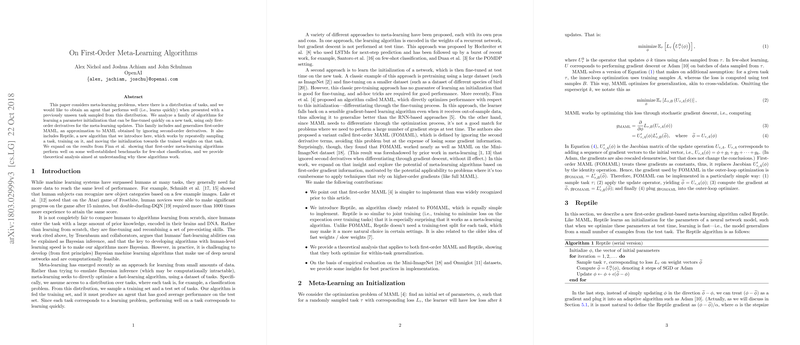Overview of "On First-Order Meta-Learning Algorithms"
In the paper "On First-Order Meta-Learning Algorithms," Alex Nichol, Joshua Achiam, and John Schulman address the problem of meta-learning, where the goal is to train an agent that can adapt quickly to new tasks by leveraging a distribution of available tasks. The paper introduces and evaluates a family of algorithms designed to learn parameter initializations that can be fine-tuned using first-order derivatives, rather than relying on computationally expensive second-order derivatives.
Key Contributions and Findings
- First-Order Generalization: The paper builds on first-order Model-Agnostic Meta-Learning (FOMAML), a simplified version of MAML that ignores second-order derivatives. The authors emphasize the simplicity of implementing FOMAML and present Reptile, a novel algorithm that also operates using first-order gradients.
- Reptile Algorithm: Reptile iteratively fine-tunes on tasks and updates the initialization towards the post-fine-tuning weights. This method does not require a training-test split for each task, thus simplifying the implementation in some settings.
- Theoretical Analysis: The authors provide a theoretical framework showing that both FOMAML and Reptile optimize for within-task generalization. Even though these first-order methods exclude second-order gradient information, they still align updates to improve performance across task distributions.
- Empirical Evaluation:
- Few-Shot Classification: The algorithms are tested on benchmarks such as Mini-ImageNet and Omniglot. Reptile demonstrated competitive performance, slightly outperforming FOMAML on Mini-ImageNet and showing minor trade-offs on Omniglot.
- Gradient Analysis: Different linear combinations of inner-loop gradients were tested, revealing that more extensive batching and multiple minibatch gradients improve learning outcomes.
Insights and Implications
The empirical results indicate that first-order methods like Reptile can achieve strong performance with reduced computational complexity compared to full MAML. The implications of this are significant, particularly for practical scenarios requiring rapid adaptation to new tasks without the computational overhead of calculating higher-order derivatives. By simplifying the computational requirements, these methods become more accessible for broader application areas, including reinforcement learning and real-time systems.
Future Directions
Several promising avenues for future research arise from this paper:
- Optimization Beyond Meta-Learning:
Further investigation could explore the extent to which stochastic gradient descent automatically optimizes for generalization, effectively performing MAML-like updates in standard training regimes.
- Reinforcement Learning Applications:
Although initial attempts yielded negative results, adapting Reptile for reinforcement learning tasks warrants further experimentation, potentially requiring modifications to the algorithm.
- Architectural Enhancements:
Exploring deeper architectures and integrating regularization techniques could bridge the gap between training and testing errors, potentially improving few-shot learning performance.
- Diverse Data Problems:
Reptile could be evaluated in different contexts such as few-shot density modeling, highlighting the versatility of first-order meta-learning algorithms across various types of learning challenges.
Conclusion
The paper "On First-Order Meta-Learning Algorithms" presents a robust evaluation of first-order meta-learning techniques, showing that these methods can achieve near-optimal performance with reduced complexity. By introducing Reptile and providing comprehensive theoretical and empirical analyses, the authors contribute valuable insights into the meta-learning paradigm, paving the way for more efficient and scalable learning algorithms. The findings suggest that future advancements in this domain will likely focus on enhancing the adaptability and performance of these algorithms in a broader array of applications.
